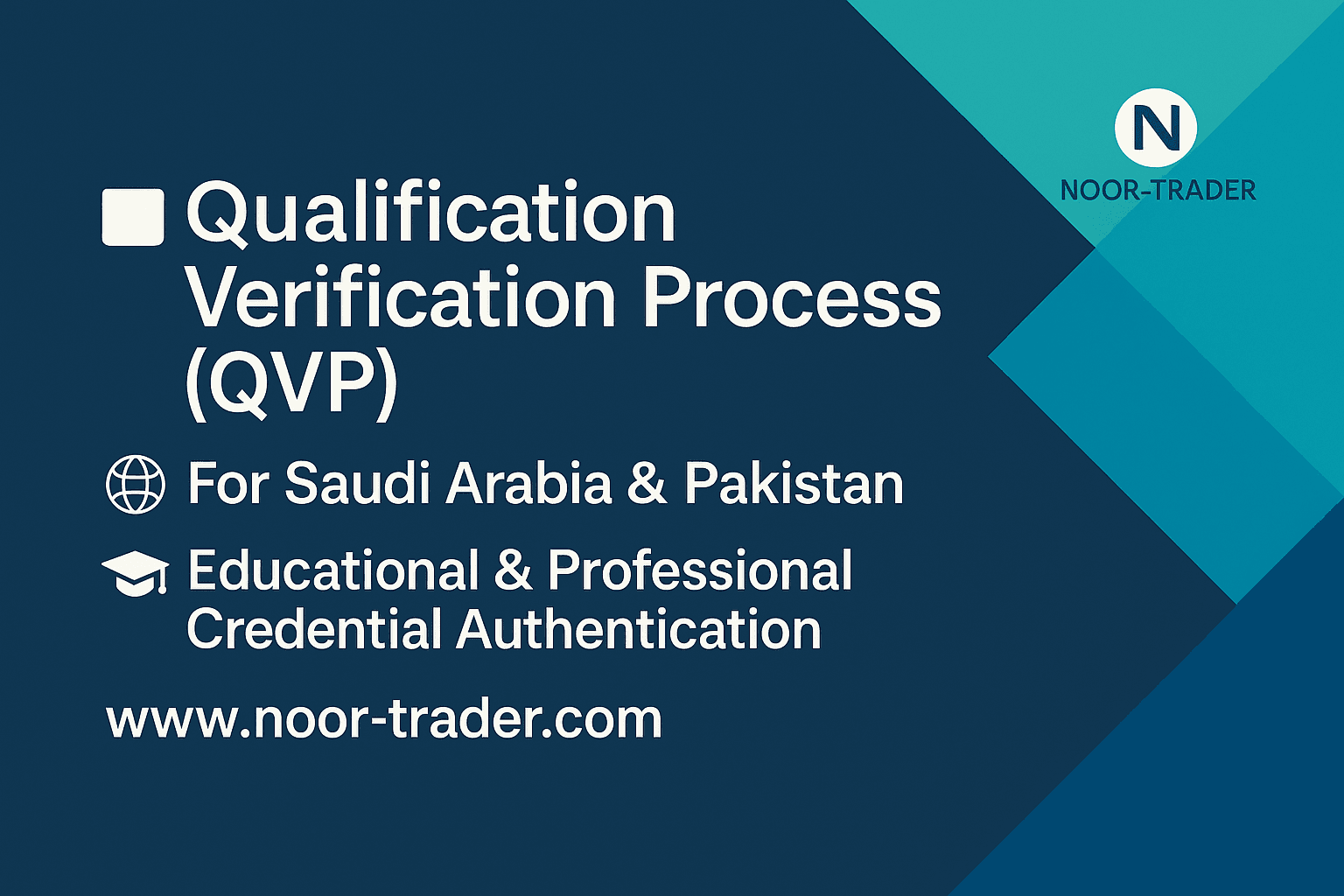
Qualification Verification Process (QVP) Requirements for Saudi Arabia and Pakistan: A Comprehensive Guide
In an increasingly globalized world, accurate and verified documentation of qualifications has become a critical component of international travel and employment procedures. The Qualification Verification Process (QVP) ensures that individuals presenting academic or professional credentials for foreign employment, immigration, or licensing are providing valid and authenticated documents. This article provides a detailed overview of QVP requirements for Saudi Arabia and Pakistan, who needs a QVP certificate, and what the process involves.
List of QVP – Qualification Verification Process (QVP) Requirements for Saudi Arabia and Pakistan: A Comprehensive Guide
What is QVP?
The Qualification Verification Process (QVP) is a formal procedure that verifies and authenticates an individual’s educational or professional credentials. The goal is to confirm the legitimacy of certificates, degrees, diplomas, or training records submitted for international use.
QVP is often mandatory for:
Employment visas
Professional licensing
Residency applications
Academic admissions
Immigration purposes
QVP Requirements for Saudi Arabia
Saudi Arabia enforces strict rules around credential verification, particularly for skilled professionals. The Saudi Ministry of Education, Saudi Embassy, and Saudi Cultural Missions (e.g., in Islamabad or New Delhi) collaborate with third-party verification agencies to ensure all submitted educational credentials are legitimate.
Key Points:
Mandatory for employment visas, especially in sectors like healthcare, engineering, education, and IT.
QVP is handled via DataFlow Group and Saudi Enjaz system.
Applicants must attest their educational documents from their home country’s Ministry of Foreign Affairs and the Saudi Embassy.
Certain professions must also obtain licensing approval from bodies like SCFHS (Saudi Commission for Health Specialties) or the Saudi Council of Engineers.
Required Documents:
Original degree/diploma
Transcript of records
Passport copy
Offer letter from Saudi employer
Attested documents from HEC (in Pakistan) or the relevant authority
Challenges:
Long processing times (2–6 weeks)
Rejections due to discrepancies or unverified institutions
Need for Arabic translations of documents
QVP Requirements for Pakistan
In Pakistan, QVP is often required for outbound professionals who seek employment abroad, particularly in the Gulf countries. The Higher Education Commission (HEC) and Ministry of Foreign Affairs (MOFA) are key bodies that facilitate this process.
Key Points:
Required for outbound professionals applying for jobs, mostly in UAE, Saudi Arabia, and Qatar.
QVP is often part of attestation requirements for degrees and certificates.
Educational documents must be attested by HEC (for degrees) and IBCC (for matric/intermediate certificates).
Final attestation by MOFA is mandatory before submission to foreign embassies.
Required Documents:
Original academic certificates
CNIC and passport copies
University verification letters (in some cases)
Paid fee challans for attestation services
Common Scenarios:
Pakistani doctors, engineers, and IT professionals applying for Gulf jobs
Students seeking admission to international universities
Visa applicants required to verify academic background
Challenges:
Delays in university verification responses
Document discrepancies or institutional blacklisting
Limited digital access to older records
Who Needs a QVP Certificate?
A QVP certificate may be required by various groups, including:
Healthcare Professionals: Doctors, nurses, and pharmacists must verify their credentials for licensing in Saudi Arabia via the SCFHS.
Engineers and Architects: Verification is essential for registration with the Saudi Council of Engineers or Pakistan Engineering Council.
Teachers and Academicians: Teaching licenses often demand QVP, especially in KSA and UAE.
IT Professionals and Consultants: QVP may be needed for project-based or permanent roles in foreign firms.
Skilled Workers (depending on trade): Certain trades or skilled labor roles also require verification depending on job category.
Step-by-Step QVP Process
Here is a general overview of the Qualification Verification Process:
Document Preparation
Original degree, transcript, passport, CNIC
Translation (if required)
Local Attestation
In Pakistan: HEC → MOFA
In Saudi Arabia: University → Ministry of Education
Third-Party Verification
E.g., DataFlow, WES, QCI, or embassy-appointed firms
Embassy Attestation
Submit to the Saudi Embassy or other relevant foreign mission
Submission to Employer or Licensing Body
Attach the QVP certificate with job or visa applications
Potential Challenges
Institutional Backlogs: Government departments and universities can delay responses.
Document Errors: Spelling mistakes or mismatched information lead to rejections.
Non-Recognized Institutions: Degrees from unapproved or blacklisted institutes will be rejected.
Language Barriers: Arabic translation is mandatory in Saudi Arabia.
High Costs and Fees: Processing and attestation can be expensive, especially with third-party agencies.
Final Thoughts
The Qualification Verification Process (QVP) is a critical requirement for professionals seeking opportunities in Saudi Arabia, Pakistan, or other countries with strict credential validation policies. Whether you are a doctor applying for a Saudi license or a Pakistani graduate seeking a Gulf job, obtaining a QVP certificate ensures your qualifications are accepted and recognized.
Understanding the nuances of QVP procedures in each country, preparing accurate documentation, and engaging with the right authorities or agencies will save time, money, and prevent rejection of your application.

